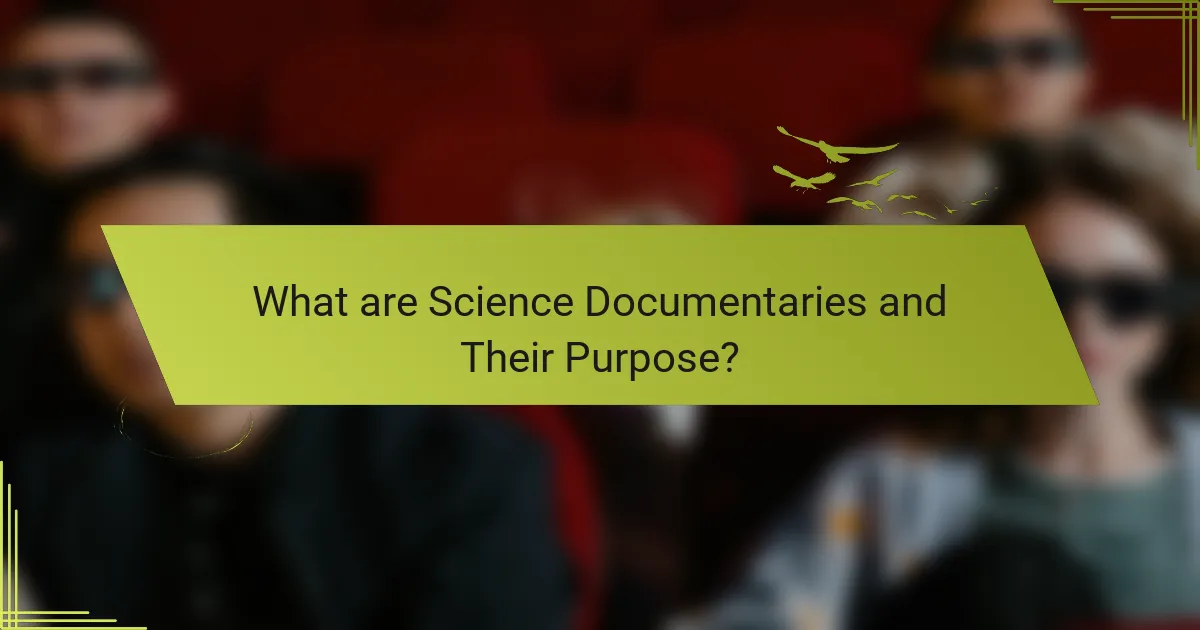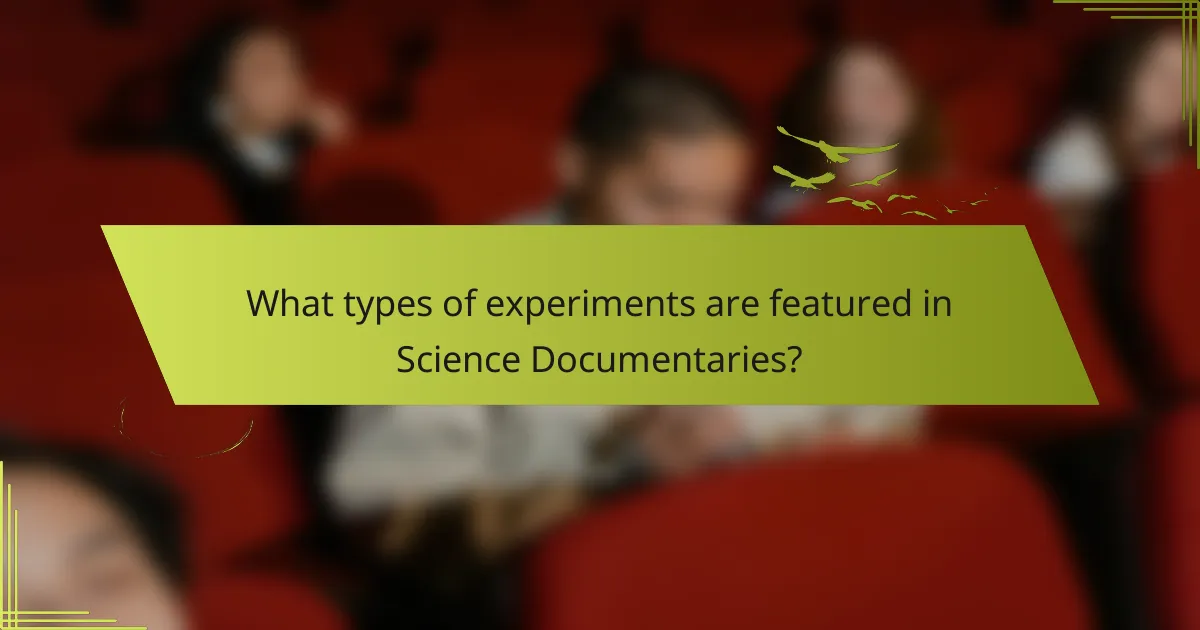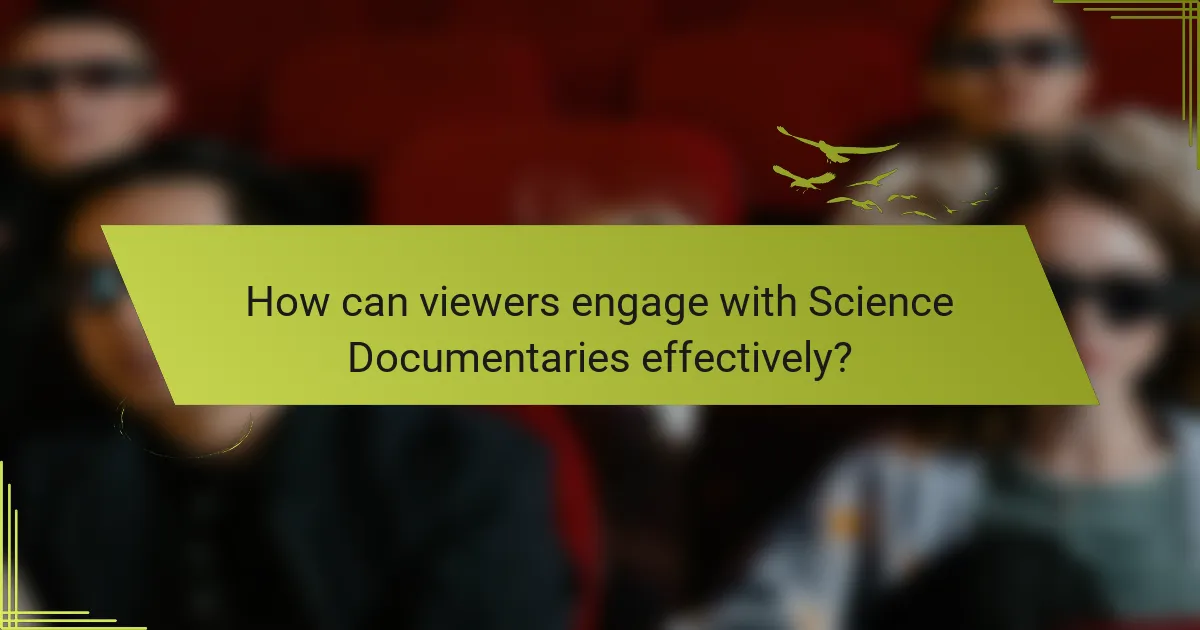
What are Science Documentaries and Their Purpose?
Science documentaries are non-fiction films that explore scientific topics and discoveries. Their purpose is to educate and inform viewers about various aspects of science. These documentaries often present complex ideas in an accessible manner. They aim to stimulate curiosity and promote scientific literacy. Many science documentaries include interviews with experts and visual representations of scientific concepts. They can cover a range of subjects, from environmental issues to technological advancements. Science documentaries contribute to public understanding of science and encourage critical thinking. Their impact can be seen in increased interest in scientific fields among audiences.
How do Science Documentaries differ from traditional documentaries?
Science documentaries focus on scientific concepts and discoveries, while traditional documentaries cover a broader range of topics. Science documentaries often utilize expert interviews, experiments, and visualizations to explain complex ideas. Traditional documentaries may rely more on storytelling and personal narratives. The production techniques in science documentaries often include animations and simulations to illustrate scientific phenomena. In contrast, traditional documentaries may emphasize historical context or social issues. Research shows that science documentaries aim to educate viewers about scientific literacy and critical thinking. Traditional documentaries usually aim to inform or entertain without a specific educational agenda.
What key elements define a Science Documentary?
A science documentary is defined by its focus on scientific topics and concepts. Key elements include factual accuracy, which ensures the information presented is based on verified research. Engaging storytelling is crucial to maintain viewer interest while conveying complex ideas. Visual elements, such as animations and graphics, help illustrate scientific principles effectively. Expert interviews provide credibility and insight into the subject matter. A clear narrative structure guides the audience through the topic logically. Additionally, the use of real-world examples connects scientific theories to everyday life. These elements collectively enhance the educational value of science documentaries.
Why are visuals important in Science Documentaries?
Visuals are important in science documentaries because they enhance understanding and retention of complex information. They provide clear representations of scientific concepts and processes. Visuals can illustrate abstract ideas, making them more accessible to viewers. For example, animations can depict molecular structures or astronomical phenomena that are difficult to visualize. Studies show that people retain information better when it is paired with relevant imagery. A report by the National Training Laboratories indicates that retention rates improve significantly with visual aids. Additionally, visuals engage viewers emotionally, fostering a connection to the subject matter. This engagement can lead to increased interest in science and its applications. Overall, visuals are crucial for effective communication in science documentaries.
What innovations are showcased in Science Documentaries?
Science documentaries showcase innovations such as advanced imaging technologies, interactive storytelling, and real-time data visualization. Advanced imaging technologies include high-definition cameras and drones that capture detailed visuals of scientific phenomena. Interactive storytelling engages viewers by allowing them to explore scientific concepts through immersive experiences. Real-time data visualization presents complex data in accessible formats, enhancing understanding. These innovations improve educational value and viewer engagement. For example, the use of 3D animations helps illustrate complex biological processes. Documentaries like “Cosmos: A Spacetime Odyssey” utilize these techniques to explain intricate scientific theories effectively.
How do Science Documentaries highlight technological advancements?
Science documentaries highlight technological advancements by showcasing innovations and their impacts on society. They present real-world applications of technology through detailed case studies. These documentaries often feature interviews with experts and inventors. This provides insights into the development processes behind new technologies. They also include visual demonstrations of technological applications in various fields. For example, documentaries may explore advancements in renewable energy or medical technology. Statistics and research findings are often presented to illustrate the effectiveness of these technologies. Additionally, science documentaries aim to educate viewers on the implications of these advancements for the future.
What role do new scientific discoveries play in these films?
New scientific discoveries serve as central themes in these films. They drive the narrative and engage viewers with cutting-edge research. Films often highlight breakthroughs in fields like medicine, technology, and environmental science. These discoveries provide context for the challenges faced by society. They illustrate the potential benefits and risks associated with scientific advancements. Documentaries often include interviews with scientists to validate the information presented. This adds credibility and depth to the storytelling. Additionally, they encourage public interest in science and inspire future research. Overall, new scientific discoveries enhance educational value and promote critical thinking among audiences.

What types of experiments are featured in Science Documentaries?
Science documentaries feature a variety of experiments, including controlled experiments, field studies, and demonstrations. Controlled experiments test hypotheses in a structured environment. Field studies observe natural phenomena in real-world settings. Demonstrations showcase scientific principles in an engaging manner. These experiments often highlight key scientific concepts and innovations. They provide viewers with insights into the scientific method and real-world applications. For example, documentaries may explore climate change experiments or medical research trials. This variety enhances educational value and fosters public interest in science.
How are real-life experiments presented in these films?
Real-life experiments in these films are presented through a combination of dramatization and documentary-style narration. They often feature real scientists conducting experiments in controlled environments. The films emphasize the scientific method, showcasing hypothesis formulation, experimentation, and analysis of results. Visual aids, such as graphs and animations, are frequently used to illustrate complex concepts. Interviews with experts provide context and credibility to the findings. Additionally, the films often highlight the implications of the experiments on society and future research. This approach engages viewers and enhances understanding of scientific principles.
What ethical considerations are addressed in experimental documentaries?
Experimental documentaries address several ethical considerations. These include informed consent from participants. Filmmakers must ensure that individuals understand their involvement. Additionally, the representation of truth is crucial. Documentaries should avoid misleading audiences through manipulation. Privacy concerns are also significant. Filmmakers need to respect the confidentiality of their subjects. Furthermore, the potential impact on communities is a critical factor. Documentaries can influence public perception and should consider this responsibility. Lastly, ethical sourcing of materials is essential. Using copyrighted content without permission can lead to legal issues. These ethical considerations guide filmmakers in creating responsible and impactful works.
How do filmmakers ensure the accuracy of experimental representations?
Filmmakers ensure the accuracy of experimental representations by conducting thorough research and collaborating with experts. They often consult scientists and professionals in relevant fields to validate their content. This collaboration helps to ensure that scientific principles are accurately depicted. Additionally, filmmakers may use peer-reviewed studies as references for factual information. They often incorporate real-life experiments and case studies to provide authenticity. Filmmakers also utilize visual aids and animations to clarify complex concepts. This approach enhances viewer understanding and maintains scientific integrity. By adhering to these methods, filmmakers create credible and informative representations in their documentaries.
What are the educational benefits of watching Science Documentaries?
Watching science documentaries enhances understanding of complex scientific concepts. They simplify intricate topics through visual storytelling. This format aids in retaining information better than traditional learning methods. Documentaries often feature expert interviews, providing credible insights. They also present real-world applications of scientific theories. Engaging narratives spark curiosity and inspire further exploration. Research indicates that visual learning can improve comprehension by up to 60%. Overall, science documentaries serve as effective educational tools.
How do these documentaries enhance understanding of complex topics?
Documentaries enhance understanding of complex topics by simplifying intricate information. They break down challenging concepts into digestible segments. Visual aids and storytelling techniques make abstract ideas more relatable. Engaging narratives keep viewers interested and motivated to learn. Expert interviews provide credible insights and real-world applications. Statistics and case studies illustrate the impact of the topics discussed. Research shows that visual learning improves retention rates significantly. Overall, documentaries serve as effective educational tools for diverse audiences.
What age groups benefit most from Science Documentaries?
Children and teenagers benefit most from science documentaries. These age groups are in critical stages of cognitive development. Science documentaries can enhance their understanding of complex concepts. Studies show that visual learning aids retention of information. Children aged 6-12 are particularly responsive to engaging visuals and narratives. Teenagers, aged 13-19, benefit from documentaries that connect scientific principles to real-world applications. Research indicates that exposure to science content during these formative years fosters interest in STEM fields. This interest can lead to higher academic performance in science-related subjects.

How can viewers engage with Science Documentaries effectively?
Viewers can engage with science documentaries effectively by actively taking notes during viewing. This practice enhances retention of key concepts and ideas presented. Engaging with supplementary materials, such as articles or interviews related to the documentary, can deepen understanding. Discussing the documentary with peers or online communities encourages diverse perspectives and critical thinking. Additionally, viewers should consider re-watching segments that are complex or particularly interesting. This allows for a more thorough comprehension of the subject matter. Utilizing interactive platforms or apps that accompany the documentary can also provide an enriched learning experience. Research indicates that active engagement leads to improved learning outcomes (Hattie, J. & Donoghue, G., 2016).
What strategies can enhance the viewing experience of Science Documentaries?
Engaging with science documentaries can be enhanced through several strategies. First, selecting high-quality, well-researched content is crucial. Documentaries with accurate information and compelling narratives attract viewers. Second, utilizing interactive elements, such as quizzes or discussion forums, engages the audience further. Research shows that interactive content increases retention rates by up to 60%. Third, incorporating multi-sensory experiences, like immersive visuals and soundscapes, can heighten emotional engagement. Studies indicate that emotional connection enhances memory recall. Lastly, providing supplementary materials, such as articles or interviews, expands understanding and context. These strategies collectively improve the overall viewing experience of science documentaries.
How can discussions and follow-up research deepen understanding?
Discussions and follow-up research can deepen understanding by facilitating the exchange of ideas and clarifying complex concepts. Engaging in discussions allows participants to articulate their thoughts and challenge assumptions. This process often reveals gaps in knowledge and encourages critical thinking. Follow-up research provides additional information that can confirm or refute initial findings. It enhances comprehension by offering diverse perspectives and evidence. Studies show that collaborative learning environments improve retention and application of knowledge. For instance, a study published in the Journal of Educational Psychology found that peer discussions significantly increased understanding of scientific concepts.
What are some recommended Science Documentaries to watch?
“Cosmos: A Spacetime Odyssey” explores the universe’s mysteries. “Our Planet” showcases Earth’s biodiversity. “The Blue Planet” dives into ocean ecosystems. “The Mind, Explained” examines the human brain. “Inside Bill’s Brain” offers insights into Bill Gates’ philanthropic efforts. “The Social Dilemma” discusses social media’s impact on society. “Particle Fever” follows the Large Hadron Collider’s discoveries. “Chasing Ice” documents climate change through time-lapse photography. “The Ivory Game” investigates the ivory trade and conservation efforts. Each documentary provides educational value and raises awareness on critical scientific issues.
Which documentaries focus on groundbreaking scientific research?
“Cosmos: A Spacetime Odyssey” explores significant scientific theories and discoveries. It covers topics like evolution and the universe’s structure. “The Gene: An Intimate History” delves into genetic research and its implications. “Our Planet” addresses climate change and biodiversity through scientific data. “Chasing Ice” documents the effects of climate change on glaciers, showcasing real-time data. “The Ivory Game” investigates wildlife trafficking, combining science and conservation efforts. Each documentary presents groundbreaking research and findings that shape our understanding of the world.
What are some iconic Science Documentaries that have influenced public perception?
“Cosmos: A Spacetime Odyssey” is an iconic science documentary that has significantly influenced public perception. Released in 2014, it is hosted by Neil deGrasse Tyson. The series explores the universe’s vastness and the principles of scientific inquiry. It emphasizes the importance of science in understanding our world. “The Blue Planet,” released in 2001, also shaped public awareness about marine life and environmental issues. It showcased the beauty and fragility of ocean ecosystems. “An Inconvenient Truth,” released in 2006, raised awareness about climate change. The film presented scientific data on global warming and its impacts. Each of these documentaries has contributed to a greater public understanding of critical scientific issues.
How can viewers apply lessons learned from Science Documentaries in real life?
Viewers can apply lessons learned from science documentaries in real life by implementing scientific principles and critical thinking in everyday situations. For instance, understanding environmental issues can lead to sustainable practices at home. Viewers may adopt recycling, energy conservation, or reducing waste based on insights gained.
Additionally, documentaries often highlight health-related topics. This knowledge can encourage healthier lifestyle choices, such as improved nutrition and regular exercise. Learning about scientific methods can enhance problem-solving skills, enabling viewers to approach challenges methodically.
Furthermore, documentaries can inspire curiosity and lifelong learning. This motivation can lead to further exploration of scientific topics through books, courses, or discussions. Engaging with the scientific community, such as local science fairs or clubs, can also stem from these documentaries.
In summary, applying lessons from science documentaries fosters informed decision-making and encourages proactive engagement with scientific concepts in daily life.
Science documentaries are non-fiction films that focus on scientific topics and discoveries, aiming to educate viewers and promote scientific literacy. This article explores the key elements that define science documentaries, their differences from traditional documentaries, and the importance of visuals in enhancing understanding. It also highlights the innovations showcased in these films, the types of experiments featured, and the ethical considerations filmmakers must address. Additionally, the article discusses the educational benefits of watching science documentaries, strategies for effective engagement, and recommendations for notable documentaries that influence public perception and inspire real-life applications of scientific knowledge.